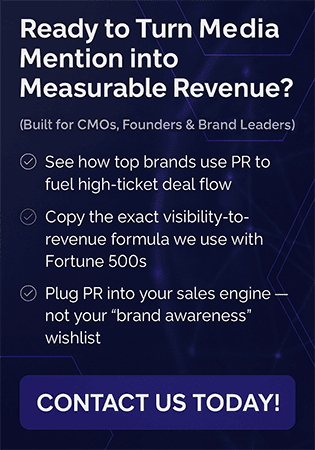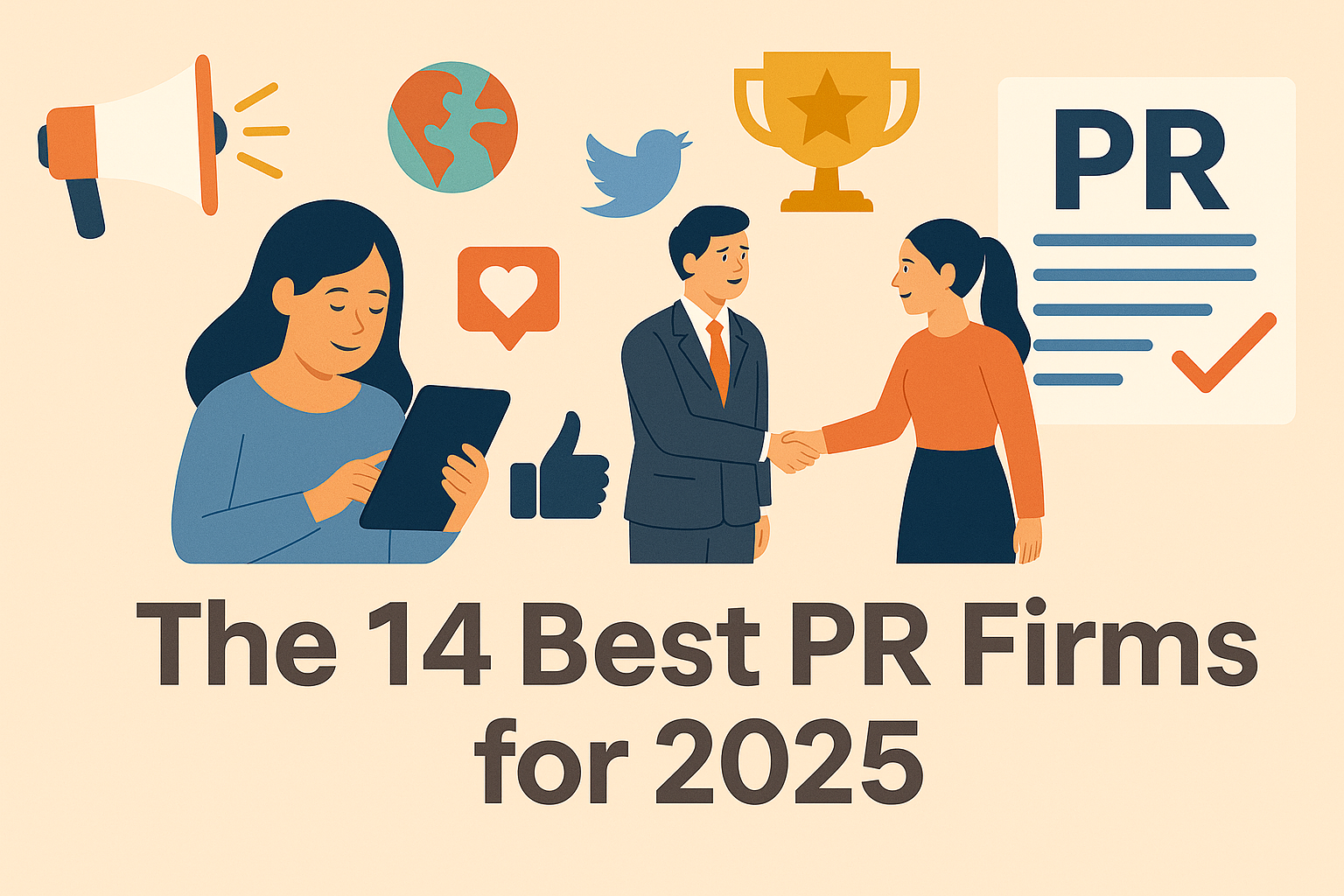Public relations is often one of those functions that gets pushed onto the marketing team. The thinking seems to go, “They’re already working on increasing brand awareness—why not add some PR into the mix? It’s basically the same thing.”
Now, if you’re a CMO or a marketing professional who’s been in this position before, then you know: PR and marketing are NOT the same.
And expecting a marketing team to add PR to their already lengthy list of duties, and then asking them to be accountable for the results, is not only ineffective. It’s also a swift road to burnout.
This is part of why the average tenure for a CMO is just 40 months, according to research by the corporate headhunting group Spencer Stuart.
If this is the state your brand is in—asking non-PR pros to handle PR, or just getting started and wondering what the first step should be—this post will show you some of the telltale signs that you need a PR agency to step in.
Let’s get started!
You’re able to get lower-tier press, but not top-tier.
One of the biggest reasons to start working with a B2B PR agency is that they can help you break into the top tier of press outlets: The Wall Street Journal, Harvard Business Review, The New York Times, Ad Week.
This is the barrier that many brands struggle to break through, and in Zen Media’s case, it’s the thing we hear most often from brands that decide to partner with us.
While getting onto your local news or scheduling an interview on a popular industry blog may happen almost on its own, with a minimal amount of effort from a brand, the reality is that getting into those major, first-tier publications does not.
This is where PR professionals can be a massive help. They know the outlets, they know which journalists cover which topics, and they have strong relationships with those journalists and other creators that help your pitch get seen.
Without working with a PR pro or PR agency, it’s unlikely you’ll be able to break that ceiling.
You’re unable to determine ROI.
Determining ROI on PR is never straightforward, but without the right tools and expertise, it’s nearly impossible.
Our team uses PR reporting tools like Cision and Meltwater to help determine the size of the audience, reach, and influence an outlet has, but we also stay laser-focused on broader analytics tools, like Google Analytics.
Here’s how it works.
Let’s say you got a piece of great press in Forbes, with a link to your website.
By looking at the traffic sources on your Google Analytics dashboard and clicking “Referral,” you can see whether that piece of press actually sent people to your site.
How much of that traffic was new? How much was qualified traffic? How high (or low) was the bounce rate? Are they visiting other pages on your site, downloading content, filling out an email capture form?
There are tons of information you can get about how PR hits are affecting your overall ROI—it just takes a good deal of time and effort to find it. That’s why a B2B PR agency can be a huge help.
Download the "8 Signs Your PR Strategy Needs a Professional" Report
Your CEO has unrealistic expectations.
Because CEOs have to take a big-picture view of your organization, as well as answer to shareholders or a board, it’s very easy for them to get too removed from the day-to-day work that each department is doing.
In addition, there’s so much data available at our fingertips now that many CEOs have fallen into the trap of expecting data to back up every business decision and every budget request.
Related post: 6 Tips to Budget like a CFO and Maximize your Digital Marketing Spend
If you’re already defending your marketing budget every quarter, do you really want to have to defend what you’re spending on PR efforts, too? Especially if you don’t have the time or team required to do a deep dive into the ROI with every press hit?
Let your B2B PR agency handle that for you.
Related post: 11 Most Common Misconceptions About Public Relations
You feel like you’re spending lots of time and money, but not getting the results you expect.

B2B PR is a long game, and it can be tough at times to know whether you’re slowly building momentum, or swinging and missing.
A B2B tech PR agency will not only be able to speed up the rate at which you get press attention, but they’ll also be able to give you realistic expectations when it comes to how quickly you can expect results. The timeline will vary depending on your industry, niche, and current brand awareness levels, not to mention external factors like the time of year, news cycle, etc.
You don’t know what to do after you get the press hit.
Something we see with our clients often, in addition to not being able to break into top-tier press, is that their efforts stop once they get the mention or feature they’ve been working for.
Actually, we see this with other PR agencies, too.
The thing with PR, especially in today’s digital ecosystem, is that getting that press hit is just the beginning.
There is so much you can do to amplify that attention and turn it into much more. For example, if your CEO is interviewed on a podcast, you can (and should!):
- Share the link on social media
- Write a blog post about it and link to the episode
- Record a video of your CEO, or another member of the C-suite, introducing the episode, and posting it on Instagram Stories or TikTok
- Include a relevant clip of the episode in further pitching (emphasis on relevant)
- Thank the host in a social media post and mention a few topics you discussed with them
- Develop a paid ads campaign around the press hit
A B2B tech PR agency that understands this crucial step—amplification—can help you get the absolute biggest bang for your buck with every press hit. That’s because amplification leads to increased credibility and awareness, which increases your share of voice. This, in turn, increases your market share and ultimately, revenue.
You aren’t able to sustain momentum—awareness flares up, but then dies down again.
If you’re seeing lots of attention when you get a piece of press, but it doesn’t seem to turn into anything long-term, it’s time to call in an agency.
Often, this problem is due to one or more of these issues:
- You aren’t engaging in the amplification activities described above
- You aren’t tying each mention or feature to your brand’s bigger story—in other words, there’s a mismatch between the angles you’re getting attention for and your larger brand narrative
- Too much time elapses between one press hit and the next, so you’re not in the public eye long enough to become top-of-mind for your audience.
This is an understandably frustrating place to be. It seems like your efforts should be paying off—after all, you’re getting attention—but it just isn’t being sustained.
A PR professional can help you here by drumming up more attention, faster, as well as tweaking your angles and pitch process so that your PR efforts actually move the needle on your larger business goals.
You’re not sure what kinds of PR opportunities exist outside the traditional outlets.
Just like digital marketing, the world of PR is changing so fast it’s difficult to keep up with the opportunities available. Unless it’s your job to do so, that is.
A PR agency will know the newest, most effective, and most creative options for your brand to seek out, as well as the ones that may seem flashy, but ultimately aren’t worth the effort.
Things like:
- Clubhouse panels
- LinkedIn live streams
- ProductHunt campaigns
- Reddit AMAs
- Virtual or hybrid conferences
So if you find yourself pitching print, TV, and blogs over and over again, you may want to call up that PR agency.
You’re going for long stretches without any press attention.
Getting the occasional press hit is nice, and if the hit is in a big outlet, it can increase your conversions dramatically.
But once the attention dies down, you’re often left with things returning back to their normal levels.
A PR agency can develop a comprehensive, long-term PR strategy that is specifically designed to keep your name in the public eye.
These types of campaigns generally include things like opportunities for quotes, appearances on panels or at events, and mentions—things that are easier and less time-consuming than writing a full bylined article, for example, or filming a 30-minute interview with a YouTube creator.
Within this long-term strategy, your PR team can develop specific campaigns around product launches or other events, as well as hone in on larger opportunities as they come.
Are you struggling to keep up with PR activities in addition to your marketing work? We’re here to help. Contact us today!





